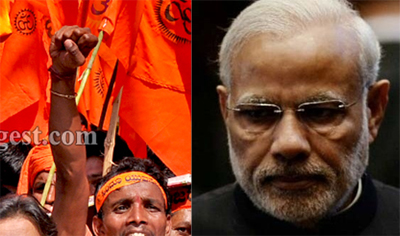Washington, Feb 27: Expressing serious concern over violence against religious minorities in India, 34 top American lawmakers have asked Prime Minister Narendra Modi to take immediate steps to protect their fundamental rights and bring the perpetrators to justice.
"We urge your government to take immediate steps to ensure that the fundamental rights of religious minorities are protected and that the perpetrators of violence are held to account," the lawmakers, including eight Senators, said in a letter to the Prime Minister.

Among others the letter was signed by Senators Roy Blunt, Amy Klobuchar, James Lankford, Al Franken, Tim Scot, Ben Sasse, John Boozman and Steve Daines.
The letter was signed by 24 members from the US House of Representatives including Joseph Pits, Keith Ellison, Brad Wenstrup, Jim Costa, Trent Franks, Ted Poe and Mark Walker.
"We also urge you to take steps to control the activities of groups, such as the Rashtriya Swayamsevak Sangh (RSS), and instruct Indian security forces to enforce the rule of law and protect religious minority communities from religiously- motivated harassment and violence," the lawmakers said.
"On June 17th, 2014, more than 50 village councils in the Bastar district of Chhattisgarh adopted a resolution banning all 'non-Hindu religious propaganda, prayers, and speeches' in their communities," the letter said, adding that the Christian minority community has been dramatically affected.
"The ban effectively has criminalised the practice of Christianity for an estimated 300 Christian families in the region one day after a mob, which included members of the Vishva Hindu Parishad and Bajrang Dal, seriously injured six Christians in the village of Sirciguda.
"Since the ban was implemented, Christians in the Bastar District reportedly have been subjected to physical assaults, denial of government services, extortion, threats of forced expulsion, denial of access to food and water, and pressure to convert to Hinduism," they alleged.
Expressing concern over beef ban in India, the lawmakers said this is increasing tensions and encouraging vigilante violence against the Muslim community.
They also raised additional concerns about the lack of recognition of Sikhism as a distinct religion, which prevents members of the community from accessing social services and employment and educational preferences available to other religious communities.
Congressmen and Senators applauded Prime Minister Modi about his statement on religious freedom and communal harmony, including his promise in February 2014 that his government would "ensure that there is complete freedom of faith and not allow any religious group, belonging to the majority or the minority, to incite hatred against others."
"We urge you to turn these words into action by publicly condemning the ban on non-Hindu faiths in the Bastar District of Chhattisgarh, and the violent assaults and other forms of harassment against religious minorities throughout India," the letter said.





Comments
The more they oppose these minority religions, the more Hindus are attracted towards minority religions.
Soon Chattisgarh will be come Ekghar, and other Painthees ghars will become Muslims or Christian ghars.
The same happened after math on public anger due to 9/11 in US.
Well done...!!! if Modi have no time to think about our people than at least some body else is there to care about minorities, we learn lesson about BJP and we pray once for all we condemn Modi/RSS ruling, and bring peace in India with the help of outside lawmakers
Appreciate this gesture by American Lawmakers .
Add new comment